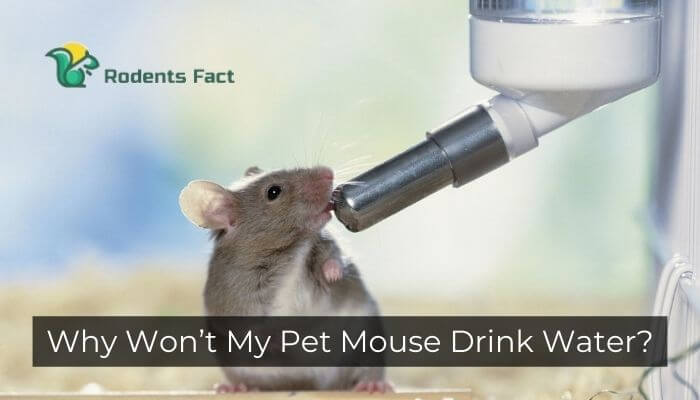Why Won’t My Pet Mouse Drink Water? Reasons Behind the Issue
The drinking water for your pet should be immaculate. Germs, bacteria, and other pollutants should not be there. You most likely have a problem if your mouse refuses to drink water. Why won’t my pet mouse drink water?

If your mouse refuses to drink water, it might be due to several factors, including dehydration or lack of access to water. If not so, there might be a lack of water access.
Another possibility is that your mouse may be drinking too much or from specific water sources, which can hurt their health over time.
Do mice drink water? If so, how much water does it need?
Mice do drink water, just like any other rodent. They rely on water for survival and it helps with their digestion, body temperature regulation, and even flushing out toxins from their bodies.

A mouse tends to drink around 3 to 9 millimeters a day. This is pretty much on the lower side and proves that these small rodents don’t need that much water to survive.
Even just a few beads of moisture are enough to keep it going for a few days. These small creatures are expert survivalists and can even go for over a month without water.
That being said, we don’t advise dehydrating your pet mouse intentionally, make sure you provide it with fresh, clean water to ensure it stays hydrated.
Check the video below of a pet mouse drinking water:
Do mice need water bottles?
Yes, if you have pet mice, it’s important to provide them with fresh and clean water every day. And there’s no better way to provide water to them than using a mouse water bottle.
Simply attach the water bottle to their enclosure and be sure to refresh the water daily to keep your mice from developing various sicknesses and health issues.
If you don’t have a water bottle, you can use a shallow water dish for the time being.
Some folks recommend providing your mouse with both a water bottle and a water dish in its enclosure. And after you’re sure that it’s taking water from the bottle, then you can get rid of the water dish.
You should also check the water bottle regularly to ensure the water flow is unobstructed.

Mice are notorious for chewing their water bottles, especially if they don’t have enough toys to play with. As such, you should consider getting a durable bottle, say one made of glass, to minimize the chances of your mouse chewing it.
You should also get a bottle design that’s ideal for the type of housing you put your mouse stays in, whether it’s an aquarium or a cage.
Don’t forget to choose a water bottle with the right capacity for keeping all your mice hydrated.
How to track if your mouse is drinking water or not?
The easiest way to track if your mouse is drinking or not is by keeping an eye on the water level in its water bottle. If you notice a decrease in the water level inside the bottle, then it’s a good sign your mouse is taking water.
If you don’t notice a change in the water level, check that the water bottle is dispensing water properly and that nothing is blocking the water flow.
Also, makes sure you provide your pet with clean and fresh water as it could be the reason it’s not drinking the water.

You can also check if your mouse takes in water by looking out for various dehydration symptoms in the animals.
Key symptoms to look out for include sunken eyes, the skin slowly returning to its position after you gently pull it, dry mouth, and loss of weight.
If your mouse doesn’t seem to drink the water, it could be having an underlying medical issue, so it’s best to consult a vet for professional help.
How Do I Give My Mouse Water?
A mouse can dehydrate quickly if it doesn’t have access to water. Here are some tips on how to give your mouse water:

- If you have a water bottle that you can fill up with water and put next to the mouse, you can give it a drink that way.
- If you don’t have a water bottle, you can try using a dropper to give your mouse a drink.
Why Is My Mouse Not Eating or Drinking?
There can be something blocking its food or water entry. To determine if this is the case, remove any objects that could be in the way, and try placing the mouse in a different location.
Pet mice never drink dirty or contaminated water. The mouse that refuses to drink the water could suffer from some illness.
So, if the mouse still does not drink or eat, it might be suffering from a medical condition. If you are unsure what is wrong, please consult a veterinarian.

The chipmunk is another one of the cutest rodents I have seen. A Brief Guide On Chipmunks | General and Fun Facts could be able to provide a lot of information about chipmunks to know about.
How Often Do Pet Mice Drink Water?
Water is essential for pets, both for their overall health and for their oral health. A pet mouse needs about one-third of the water that a human needs. You can help your pet mouse by providing plenty of water, and also providing a water dish.
The following video shows a mouse drinking water:
How Long Can Mice Live Without Water?
Mice can live for up to two weeks without water. However, they will rapidly lose weight and eventually die if they don’t drink water.

Like any rodents, pet mice need a lot of sleep. Rats sleep for 20 to 30 minutes at a time for an average of 12 hours daily. A mouse will rest for 90 to 120 minutes at a time. So the question is When Do Pet Mice Sleep?
How Much Water Do Mice Drink a Day?
Mice consume a lot of water. A mouse will drink up to three times its weight in water per day. This is important because it helps to keep the mouse hydrated and healthy.

How Do You Treat a Dehydrated Mouse?

You can follow these steps to treat a dehydrated mouse:
- Dehydrated animals must be treated immediately by providing a measured volume of water for consumption.
- Further oral fluids or parenteral hydration must be supplied if clinical symptoms are noticed.
- Using the following formula, compute the fluid replacement volume for a fluid deficit: Body weight (grams) x % Dehydration (as a decimal value) = Fluid volume (ml)
How Can I Tell if My Mouse Is Dehydrated?
If your mouse is not moving properly, it could be because it is dehydrated. To test if your mouse is dehydrated, place it in a water bowl and leave it for a few hours. The mouse is dehydrated if it moves around or tries to eat the water.

The most frequent and unsettling habit of pet mice is biting. Although it could start out as playful biting, it can easily turn harmful and destructive. Dehydration can be a reason that your mice can bite you.
Frequently Asked Question
Why isn’t my pet mouse moving?
There could be a few reasons why your mouse isn’t moving around as much as it used to. The first possibility is that it might be infested with a pest. If you’ve noticed your mouse spending more time hiding than usual, or it’s acting lethargic, there’s a good chance it’s infested.
Why is my pet mouse breathing heavily?
One possibility is that your mouse does have a heat stroke. This might occur if your mouse cannot move or breathe properly due to the intense heat.
Final Words
Now you know why won’t my pet mouse drink water? There might be a variety of causes, including dehydration or a lack of access to water. Mice can drink up to 32 ounces of water per day.
According to veterinarians, rodents, including pet mice, require 1/2 to 1 inch of water daily, and they generally drink at least 1.5 to 3 tablespoons of water. When your pet mouse refuses to drink, it might be due to a health problem.
If the mouse hasn’t eaten for 48 hours or is recovering from an illness, it may not drink water. If he doesn’t drink much, take him to the vet.




